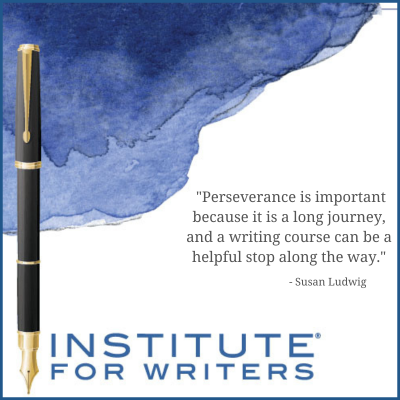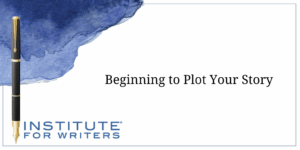
10 Plot Pitfalls to Think About
Plot can be tricky, and, as a writer, you need to be aware of what makes or breaks plot. Take a look at 10 different things to avoid in your own writing.

The month of August is a great time to consider taking a writing course. There are plenty of opportunities. Creative writing and short story courses offered at universities, community colleges, and some adult education classes typically start at the traditional beginning of the school year, but students can usually begin an online writing course at any time. That makes IFW and ICL writing courses particularly easy to jump into.
Writers of all abilities can benefit from taking a writing course and the overall effects of the instruction are noticeable to the student and to their instructor.
 Writing students’ basic skills (grammar, punctuation, word choice) are honed by studying instructional materials that accompany the course and by their instructor’s comments and suggestions throughout the course. Perhaps most important, when students get objective reviews of their writing (which happens for the duration of the lessons in the course) it tends to be more productive than having a friend or family member read and comment on their work.
Writing students’ basic skills (grammar, punctuation, word choice) are honed by studying instructional materials that accompany the course and by their instructor’s comments and suggestions throughout the course. Perhaps most important, when students get objective reviews of their writing (which happens for the duration of the lessons in the course) it tends to be more productive than having a friend or family member read and comment on their work.
Writing students will gain a deeper understanding of how a short story is put together, how to help readers connect with story characters, how to write dialogue that works to move the plot forward, and how to create a conclusion that ties the story together.
Part of a writing course curriculum may include learning the industry standard for formatting a manuscript and how to research and submit to good markets. Instructors will encourage their writing students who are interested to submit their best work to good potential markets.
After successfully completing a writing course, students almost always report that they have improved confidence in their writing. They know how valuable and important the revision process is to good writing and feel excited about continuing to create quality manuscripts. They know they can be called a writer and whatever their goals may be, they will have a resource of notes and information to refer to as they move forward with their writing.
Courses offered by the Institute provide great opportunities for teachers who educate students of any grade level. Since college credits can be awarded upon successful completion of a course offered by the Institute, these can work well for teachers’ Continuing Professional Development. And since the course can be completed at any time of day (or night) and instructors are usually somewhat flexible with due dates, teachers can work on the lessons and assignments at their own pace.
 I have worked with dozens of educators who teach children and adults and am often told that what they learned in the course is not only personally beneficial but helpful in their classroom. Teachers mention that they have developed more of an eye for putting a good story or article together—strategies that they learned in their teaching courses but presented a bit differently in the coursework here at the Institute. This translates well to their classroom teaching.
I have worked with dozens of educators who teach children and adults and am often told that what they learned in the course is not only personally beneficial but helpful in their classroom. Teachers mention that they have developed more of an eye for putting a good story or article together—strategies that they learned in their teaching courses but presented a bit differently in the coursework here at the Institute. This translates well to their classroom teaching.
It has been enlightening for me to have kept a notebook full of what I have learned from working with writers through the Institute for almost twenty years. These students have had varying abilities, an assortment of motivation levels, and they range in age from high school to well past retirement age.
When I compare students’ writing from their first lesson to their final one (as I do when they have completed the course,) it is gratifying and always encouraging to observe the sometimes subtle, sometimes large improvements they have made in their writing. Their manuscripts are almost always stronger, smoother, and more enjoyable to read. By the end of the course, students will often comment about how much they have learned about their writing and how much more confident they feel as a writer.
I find that many—but not all—students are anxious to submit their work and see their story or article published. That means these students are eager to learn as much as they can about submitting, working with editors, and how the submission process works—something the Institute’s writing courses do particularly well. There are also students who are not interested in becoming published writers and may have a goal of continuing to create stories and articles for themselves or their family. Regardless of students’ goals, responding to their questions and sharing what I know is immensely rewarding.
 Perhaps the most enjoyable part of being an instructor is seeing how some writing students have extraordinary imaginations and are eager to write about fabulous fantasy worlds that are often astonishing in their creation. These students are fun to work with because I otherwise don’t read many fantasy stories in my personal reading.
Perhaps the most enjoyable part of being an instructor is seeing how some writing students have extraordinary imaginations and are eager to write about fabulous fantasy worlds that are often astonishing in their creation. These students are fun to work with because I otherwise don’t read many fantasy stories in my personal reading.
Sometimes a story makes perfect sense in a writer’s head but getting it on paper is tricky as readers come into the story with no background knowledge about this fantasy land. Helping students hone those stories is always rewarding, and the back-and-forth communication with students is enlightening for both of us.
Students sometimes get frustrated if they have written a good manuscript but are not able to successfully publish it. They seem to believe that because they have followed all the “rules,” written the manuscript, revised it a few times, proofread it, and then found a few markets, that it should not be so difficult to get it published.
Part of my job involves helping students see that writing is a long process and publishing is not easy. Perseverance is important because it is a long journey, and a writing course can be a helpful stop along the way.
Think about moving your own writing skills forward this school year. Take a course, buy a writing book, join a writing group, or just continue to write each day.
Susan Ludwig has been an Instructor with the Institute for Children’s Literature for over 18 years. Susan’s writing credits include teacher resource guides, English language learner books, and classroom curriculum for elementary through high school students. A former magazine editor, she assesses students’ written essays as a scoring director for the SAT exam. When she is not writing or working, she is usually found playing with her grandsons or curled up with a good book.

Plot can be tricky, and, as a writer, you need to be aware of what makes or breaks plot. Take a look at 10 different things to avoid in your own writing.

Plot is more than just the chain of events within a story. There are so many elements to plot to consider when writing. Let’s dive into those elements.

Visiting new places is key to exploring new ideas and finding inspiration. Let’s see the places you can go this summer to spark your next story.
1000 N. West Street #1200, Wilmington, DE 19801
© 2024 Direct Learning Systems, Inc. All rights reserved.
1000 N. West Street #1200, Wilmington, DE 19801
© 2025 Direct Learning Systems, Inc. All rights reserved.
1000 N. West Street #1200, Wilmington, DE 19801
©2025 Direct Learning Systems, Inc. All rights reserved. Privacy Policy.
1 Comment